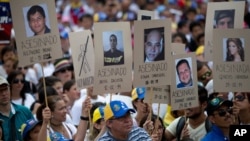CARACAS —
Venezuela has violated the rights of opposition protesters through beatings, illegal detentions and failure to follow due process, Human Rights Watch said in a report released on Monday.
The report, entitled “Punished for Protesting,” said troops used excessive force against peaceful protesters, and that state prosecutors and judges tolerated or participated in the abuses.
The report was based on research in March on 45 cases of “serious human rights violations.” The group interviewed more than 90 people, including victims and their families, and more than a dozen lawyers who provided legal counsel.
“In most of the cases we documented, security forces employed unlawful force, including shooting and severely beating unarmed individuals,” the report said. “Nearly all of the victims were also arrested and, while in detention, subjected to physical and psychological abuse.”
The New York-based group alleged 10 torture cases, with incidents of electric shocks, burns and threats of rape or execution.
At least 41 people have died, including both government and opposition supporters plus security force members, since protests began in early February, according to official figures.
Nearly 800 people have been injured and 197 of the more than 2,000 people arrested remain in jail.
President Nicolas Maduro has acknowledged some abuses by security officials, but hotly denies accusations of a systematic campaign of human rights violations. He says Venezuela's security forces were transformed when his predecessor Hugo Chavez took power in 1998.
State prosecutors have opened 142 investigations of human rights abuses, including one for torture, and detained 17 officials in connection with excessive violence.
Officials, including Interior Minister Miguel Rodriguez, have called the criticism by human rights groups part of a plan to destabilize the country.
Venezuela's socialist administration has sparred with Human Rights Watch in the past, calling it a pawn of Washington. The group has dismissed such criticism as baseless.
Protesters wielding rocks and petrol bombs for months barricaded streets and clashed with police who responded with water-cannons and volleys of tear gas.
Others have staged peaceful protests, including rallies that have at times been targeted by security forces. Pro-government armed gangs have detained or beaten protesters with the tacit approval of state officials, Human Rights Watch said.
The demonstrations began in protest against crime, inflation and product shortages. Accusations of police abuse during the unrest quickly became another motivation for the protests, which have nevertheless waned in recent weeks.
Maduro appears to have weathered the worst and shows no sign of stepping down or being pushed from office.
The report, entitled “Punished for Protesting,” said troops used excessive force against peaceful protesters, and that state prosecutors and judges tolerated or participated in the abuses.
The report was based on research in March on 45 cases of “serious human rights violations.” The group interviewed more than 90 people, including victims and their families, and more than a dozen lawyers who provided legal counsel.
“In most of the cases we documented, security forces employed unlawful force, including shooting and severely beating unarmed individuals,” the report said. “Nearly all of the victims were also arrested and, while in detention, subjected to physical and psychological abuse.”
The New York-based group alleged 10 torture cases, with incidents of electric shocks, burns and threats of rape or execution.
At least 41 people have died, including both government and opposition supporters plus security force members, since protests began in early February, according to official figures.
Nearly 800 people have been injured and 197 of the more than 2,000 people arrested remain in jail.
President Nicolas Maduro has acknowledged some abuses by security officials, but hotly denies accusations of a systematic campaign of human rights violations. He says Venezuela's security forces were transformed when his predecessor Hugo Chavez took power in 1998.
State prosecutors have opened 142 investigations of human rights abuses, including one for torture, and detained 17 officials in connection with excessive violence.
Officials, including Interior Minister Miguel Rodriguez, have called the criticism by human rights groups part of a plan to destabilize the country.
Venezuela's socialist administration has sparred with Human Rights Watch in the past, calling it a pawn of Washington. The group has dismissed such criticism as baseless.
Protesters wielding rocks and petrol bombs for months barricaded streets and clashed with police who responded with water-cannons and volleys of tear gas.
Others have staged peaceful protests, including rallies that have at times been targeted by security forces. Pro-government armed gangs have detained or beaten protesters with the tacit approval of state officials, Human Rights Watch said.
The demonstrations began in protest against crime, inflation and product shortages. Accusations of police abuse during the unrest quickly became another motivation for the protests, which have nevertheless waned in recent weeks.
Maduro appears to have weathered the worst and shows no sign of stepping down or being pushed from office.





